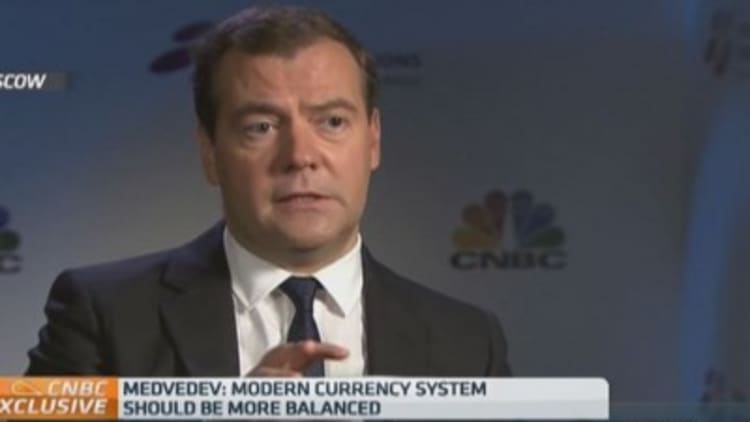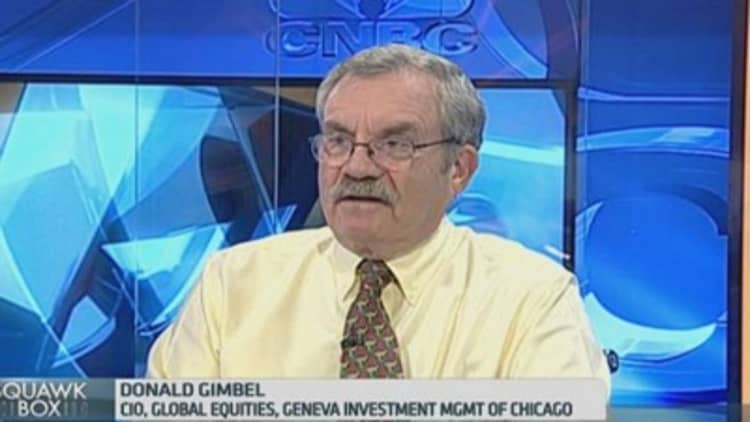
Russia's Prime Minister Dmitry Medvedev told CNBC that the world must move away from its dependence on the U.S. dollar, arguing that the global economy would benefit from a more diversified currency system.
In an exclusive interview that aired Wednesday, Medvedev said he did not have a "special negative attitude" toward the dollar— the global reserve currency—but said a "much more just financial system" was possible.
"We have nothing against the dollar, but we believe that today's currency system should be more balanced," he said in the interview Tuesday. He called for a greater number of major reserve currencies, which are held as foreign exchange reserves by the world's central banks and are used in international trade.
Read MoreRussia-US relations reset 'impossible': PM Medvedev
Medvedev highlighted that countries like Russia "really depend" on both the dollar and U.S. economy and are, as such, somewhat beholden to their fortunes.
"The U.S. economy is now improving, but we have no proof that it will not go down again, and then everyone will suffer," he said. "We believe that we should move away from such dependency in the world's financial system."
Read MoreRussia sanctions: Who's losing out so far
It's not just Russia that would benefit from such a shift, according to Medvedev, who highlighted that emerging economies could also gain. "At the end I would like to say: The world economy would benefit from it in general."
China relationship
The deterioration in relations between Russia and the West in recent months over the Ukraine crisis has led Moscow to look East. On Monday, Medvedev and China's Premier Li Keqiang signed energy, trade and finance agreements and agreed on a 150 billion yuan ($25 billion) currency swap.
Medvedev such said a move would enable Russia to trade with China directly, bypassing the dollar. "This is a good demonstration that if somebody leaves their place, another person occupies their place," he added.
The agreements with China were not politically motivated, Medvedev said, and made economic sense because China was already a major trade partner of Russia.
"But at the same time we have to take into account everything that is going on around Russia, and if a part of the projects with the Europeans, Americans or someone else is frozen … of course we'll have to shift those projects to other places," he added.

Economic slowdown
Monday's deals follow a high-profile gas supply deal with Gazprom, worth $400 billion, signed in May. Russia's gas producer agreed to supply China with gas over 30 years.
Read MoreObama, Merkel warn Russia against intervention
It comes amid concerns of Russia's ability to innovate and compete internationally, given the prominence of state-owned gas and oil giants, Gazprom and Rosneft.
But Medvedev said the companies were required to act in accordance with corporate law, and "must be interested in investing in innovation".
Russia's economic expansion has slowed dramatically since tensions with the European Union and U.S. flared up this year. The country has been battling the pain of sanctions from the West since March, when it annexed the Crimean peninsula from Ukraine.
The penalties have targeted the country's energy, defense and finance sectors, and have made it hard for Russian businesses raise finance in the West.
Read MoreObama: We will join EU in intensifying sanctions on Russia
The ruble has fallen over 20 percent against the U.S. dollar this year, and there has been a surge in capital outflows from Russia. Earlier this month, the International Monetary Fund halved its growth forecast for Russia to just 0.5 percent next year.
Medvedev admitted that Russia must look to diversify beyond the oil and gas sectors, which dominate its economy, but argued that a shift toward innovation was taking place, even within its state-owned companies.
"The environment is forming which is made up of small, private start-up companies," he said.



